Papers by Assaf Likhovski
משפט והיסטוריה, 2024
מאמר המאפיין את אופי מחקריו ההיסטוריים של יורם שחר במסגרת כנס שנערך לכבודו בשנת 2022
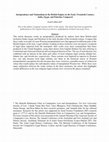
This article discusses works on jurisprudence produced by authors from three British-ruled territ... more This article discusses works on jurisprudence produced by authors from three British-ruled territories (India, Egypt, and Palestine) in the early decades of the twentieth century. It argues that these works were part of a non-Western jurisprudential wave that appeared in different parts of the British Empire at the time. Legal scholars working in these territories were not passive recipients of legal ideas imported from the metropole: their works were more cosmopolitan than those produced in the United Kingdom, using ideas drawn from English thinkers but also referring to Continental and American historical and sociological theories of law. The use of such theories was combined with an interest in the ideas and values of local religious legal systems (Hindu law, Islamic law, and Jewish law, respectively). These systems were depicted as superior to Western law-not only because local legal scholars saw them as the historical source of Western jurisprudential conceptions but also because they were viewed as a possible source of collectivist values that would replace the individualist values of transplanted Western law. While there were many similarities between the works written in the three territories, the article also highlights certain differences in the way religious legal systems were viewed in the places examined.
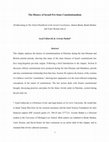
The Oxford Handbook of the Israeli Constitution (Aharon Barak, Barak Medina and Yaniv Roznai, eds., Oxford, Oxford University Press))
This chapter analyzes the history of constitutionalism in Palestine during the late-Ottoman and B... more This chapter analyzes the history of constitutionalism in Palestine during the late-Ottoman and British-colonial periods, showing that many of the main features of Israeli constitutional law have long-forgotten pre-state origins. Following a brief Introduction to the chapter, Section II discusses official constitutional texts produced during the late-Ottoman and Mandatory periods and also constitutional scholarship from that time. Section III explores the history of the creation of a Hebrew word for "constitution," showing how arguments over the term reflected competing conceptions of the nature of constitutions. The last section deals with Zionist constitutional thought, discussing practices and plans for the future Jewish entity in Palestine, created during the pre-state era.
Clio@Themis [Online] 22 (2022)
The life of the Jewish-Latvian-Russian-American legal scholar Max Laserson was punctuated by emig... more The life of the Jewish-Latvian-Russian-American legal scholar Max Laserson was punctuated by emigration and exile. This article explores the impact that this experience had on his scholarship. While Laserson’s audience and research topics changed as he moved from place to place, his origins as both a Jew and a native of Latvia, a borderland region between East and West, influenced
his scholarship throughout his life. Wherever he lived, he became a « borderland jurist », an
intermediary who transplanted foreign ideas to a local audience.
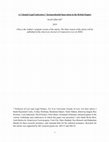
American Journal of Comparative Law , 2021
In this article, I examine jurisprudence textbooks and related works written in the British Empir... more In this article, I examine jurisprudence textbooks and related works written in the British Empire in the late-19th and early-20th centuries, focusing mostly on British India, but also discussing Mandatory Palestine and British-ruled Egypt. Some of the jurisprudential works from the British Empire were merely summaries of the leading English books. However, there were also more original works, characterized by several unique features. First, some of the works produced in the Empire were more influenced by Continental and American legal theories than the equivalent English textbooks (for example, by early-20th-century French and American sociological approaches to law). Second, the need to mention non-English legal systems in these works sometimes led their authors to question key English notions about the nature and development of law (critiquing, for example, Henry Maine’s description of Hindu law). Finally, some nationalist local legal scholars also created a unique genre of jurisprudential works: texts that used western jurisprudential theories to describe the main features of non-western legal systems, such as Hindu, Jewish and Islamic law.
These unique aspects of colonial jurisprudential works illustrate a broader phenomenon: the fact that legal scholars in imperial peripheries were not always simply passive receivers of ideas produced at the center of empires, but in some cases created works containing interesting jurisprudential insights. The notion that the British Empire was a “legal laboratory” in which legal scholars experimented with new ideas has already been discussed in the literature, largely based on examples taken from the fields of legislation (the codification of English law in 19th-century India), or forensic science. This article explores the extent to which the British Empire was also a site of jurisprudential innovation.
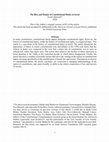
American Journal of Legal History , 2021
In many constitutions, constitutional duties appear alongside constitutional rights. However, the... more In many constitutions, constitutional duties appear alongside constitutional rights. However, the history of constitutional duties, unlike the history of constitutional rights, is a neglected topic. This article is a case-study of the history of constitutional duties in Israel. The article documents the appearance of duties in Israeli constitutional texts and debates in the 1950s and shows that the interest in duties was connected to the view that a major role of constitutions was to serve as educational, rather than legal, texts. The article then analyzes the decline of duties discourse in Israel pointing to the 1960s as the watershed decade in which duties disappeared. Finally, the article discusses a number of possible factors that led to the waning of the notion of constitutional duties, focusing specifically on the juridification of Israeli law and society. Fluctuations in interest in constitutional duties, the article concludes, are connected to changing understandings of the nature of constitutions, and, more broadly, to shifts in the relative importance of law and lawyers in society.

RÉSUMÉ
L’histoire du droit est très majoritairement pratiquée au sein des Facultés de droit par ... more RÉSUMÉ
L’histoire du droit est très majoritairement pratiquée au sein des Facultés de droit par des juristes qui ont choisi de se consacrer à l’histoire de leur discipline. Ce lien intime distingue non seulement l’histoire du droit de l’histoire des Facultés des Lettres mais également des sciences politiques et de l’histoire des sciences. Elle est ainsi communément pensée comme neutre ou apolitique, son objectif étant d’éclairer le droit par son histoire.
Issu d’un colloque qui s’est tenu à Bordeaux en 2015, cet ouvrage réunit les contributions de jeunes chercheurs français, italiens et chinois ainsi que trois historiens du droit français, états-unien et israélien. Leur thème commun est en l’occurrence l’inscription politique de l’histoire du droit. En confrontant leurs regards de juristes-historiens ou de philosophes à partir d’exemples puisés dans les époques moderne et contemporaine, en interrogeant leur historiographie et en entrant au cœur de l’épistémologie de leur « science », les auteurs réunis ici proposent une série de travaux allant de l’école de Salamanque au 16e siècle au droit public espagnol sous Franco, tout en interrogeant leurs propres méthodes et pratiques de chercheurs. Invitation à la réflexivité, ces études montrent l’ampleur des questionnements d’une jeune recherche dans une discipline qui ne cesse de se renouveler.
ABSTRACT
The history of law is overwhelmingly practiced within Law faculties by lawyers who have chosen to devote themselves to the history of their discipline. This intimate connection not only distinguishes the history of law from the history of the Letters faculties, but also from the history of political science and the history of science. It is thus commonly thought of as neutral or apolitical, its objective being to enlighten the law through its history.
Coming out of a conference held in Bordeaux in 2015, this book brings together the contributions of young French, Italian and Chinese researchers as well as three historians of French, American and Israeli law. Their common theme is the political inscription of the history of law. By confronting their views as historian-legalists or philosophers based on examples drawn from modern and contemporary times, by questioning their historiography and by entering into the heart of the epistemology of their "science", the authors gathered here propose a series of works ranging from the Salamanca School in the 16th century to Spanish public law under Franco, while questioning their own methods and practices as researchers. An invitation to reflexivity, these studies show the extent of the questions raised by a young researcher in a discipline that is constantly renewing itself.
Under the direction of Professor Nader HAKIM, with contributions from Professors David M. RABBAN, Assaf LIKHOVSKI, and Alfonso ALIBRANDI, Ludovica Gabriella BOSICA, Marine BOHAR, Kevin BREMOND, Dario Di CECCA, Jean-Philippe FERREIRA, Elisabetta FIOCCHI MALASPINA, Jean CHARRIAUD, Giulia Maria LABRIOLA, Anna NEYRAT, Antoine SENE, Alessia Maria Di STEFANO, Stefano VENERONI, Mingzhe ZHU.
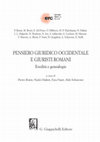
Pensiero giuridico occidentale e giuristi romani: Eredità e genealogie (Pierre Bonin, Nader Hakim, Fara Nasti and Aldo Schiavone eds., Torino: G. Giappichelli) , 2019
In the early decades of the twentieth century, a group of Jewish legal scholars working in Easter... more In the early decades of the twentieth century, a group of Jewish legal scholars working in Eastern Europe, and later in Mandatory Palestine, sought to « revive » (i.e., modernize) Jewish law and turn it into the legal system of the Jewish community in Palestine—and later the legal system of the State of Israel. Inspired by the nationalist legal ideas of the German historical school, as well as the successful revival of the Hebrew language, the Jewish legal revival project created a body of scholarship on Jewish law, established the first Jewish law school in Mandatory Palestine, and even influenced the work of a unique communal court system that functioned in the Jewish community in Palestine until the end of British rule in that territory.
The Jewish legal revival project had an ambivalent attitude to Roman law (both ancient and modern). Modern scholarship on Roman law, especially nineteenth-century German legal scholarship, was seen as a model to be emulated by the Jewish legal revivers. Indeed, the Jewish legal revival project was often simply understood as a process of reorganization of the materials of Jewish law based on legal categories, models, and methodologies taken from modern Roman law scholarship. On the other hand, the legal revivers saw Roman law as the « other » of Jewish law, often arguing that the principles underlying the latter were utterly different from those of the former. Roman law was thus imagined and used by the early-twentieth-century Jewish law scholars discussed in this article in contradictory ways: sometimes as a legal system that should be emulated, and sometimes as a legal system whose norms and institutions should be shunned. Thus, as this article shows, Roman law, as it was described in the legal thought of the group of legal scholars I study, was used as a foil against which modern Jewish legal identity could be created.
The Oxford Handbook of Legal History (Markus Dubber and Christopher Tomlins eds,, Oxford: Oxford University Press, ), 2018
This chapter of The Oxford Handbook of Historical Legal Research identifies some recent trends in... more This chapter of The Oxford Handbook of Historical Legal Research identifies some recent trends in historiography generally, and in the study of intellectual history. The chapter discusses the relevance of these trends to the study of the intellectual history of law, referring to relevant legal history works reflecting these trends, noting existing lacunas, and proposing future directions for the development of research in the study of the intellectual history of law.
Diné Yisrael , 2018
This article identifies eight recent, and relatively recent, trends in the study of the intellect... more This article identifies eight recent, and relatively recent, trends in the study of the intellectual history of law. It asks whether these trends also appear in works dealing with the history of Jewish law. By comparing developments in the study of the intellectual history of law and the study of Jewish law, this article points to some of the achievements and lacunae in contemporary Jewish law scholarship, and highlights some of the unique features that distinguish the study of the history of Jewish law from the study of the history of modern secular legal systems.
ספר אליקים רובינשטיין, 2018
מאמר זה סוקר שמונה מגמות עכשוויות בחקר ההיסטוריה האינטלקטואלית של המשפט. הוא
שואל האם ניתן לאתר מ... more מאמר זה סוקר שמונה מגמות עכשוויות בחקר ההיסטוריה האינטלקטואלית של המשפט. הוא
שואל האם ניתן לאתר מגמות דומות גם במחקרים העוסקים בהיסטוריה של המשפט העברי. על
ידי השוואת ההתפתחויות בחקר ההיסטוריה האינטלקטואלית של המשפט ובחקר המשפט
העברי, המאמר מצביע על כמה מן ההישגים וכמה מן הלאקונות בחקר המשפט העברי כיום,
ומדגיש כמה מן המאפיינים הייחודיים המבדילים בין מחקרים העוסקים בהיסטוריה של המשפט
העברי ובין מחקרים העוסקים בהיסטוריה של שיטות משפט חילוניות מודרניות

Law and History Review , 2018
Some of the founding fathers of Israel's legal system were lawyers educated in Polish law schools... more Some of the founding fathers of Israel's legal system were lawyers educated in Polish law schools. What was the impact of this background on their legal thought? There are few explicit references to Polish law in Israeli legal texts. However, indirectly, legal and constitutional ideas taken from Polish law did appear in Israeli law. This article focuses on the legal writing of four Israeli lawyers in the period immediately after Israel's independence in 1948, showing how Polish law was used by these lawyers as a source for occasional precedents, for critiquing Israeli law (dominated by English law), and, mostly, for constitutional precedents. The relatively greater impact of Polish law in the constitutional realm can be attributed to the fact that Poland (like other new countries established in the interwar period in the periphery of western Europe, such as Ireland) offered Israeli lawyers constitutional models that were both more modern, and more relevant to the specific circumstances of the new state, where religion played an important role in defining the identity of the nation. The history of the impact of Polish law on Israeli law can thus serve as an example of interwar constitutional innovation in the European periphery, and its later impact on post-World War II constitutional law.
ספר מנחם מאוטנר
This is a Hebrew version of the article "Peripheral Vision: Polish–Jewish Lawyers and Early Israe... more This is a Hebrew version of the article "Peripheral Vision: Polish–Jewish Lawyers and Early Israeli Law"
Jews and the Law (Ari Mermelstein et al. eds., New Orleans: Quid Pro Press), 2014
ירושלים בתקופת המנדט: העשיה והמורשת, 2003

Irvine Law Review , 2011
This Article discusses the use of arguments about "culture" in two debates about the imposition, ... more This Article discusses the use of arguments about "culture" in two debates about the imposition, application and abolition of income tax law: A debate about the transplantation of British income taxation to British-ruled Palestine in the early twentieth century, and a debate about tax privacy in late eighteenth-century and early nineteenth-century Britain. In both cases, "culture," or some specific aspect of it (notions of privacy) appeared in arguments made by opponents of the tax. However, it is difficult to decide whether the use of cultural arguments in these debates simply reflected some "reality" that existed prior to these debates, whether "culture" was actively constituted in these debates to further the specific interests of the participants, or whether the cultural arguments that appeared in the debates combined reflection and constitution in some determinable way. Using legal debates to learn something about culture, the Article concludes, is sometimes problematic. The Article therefore suggests an additional approach to the study of law and culture, one which focuses on the rhetorical level, seeking to map the ways in which arguments about "culture" (and related terms referring to the traditional and particular), appeared in tax law debates.

Israel Studies , 2010
In the 1980s and 1990s, a group of historians and sociologists revolutionized the study of Israel... more In the 1980s and 1990s, a group of historians and sociologists revolutionized the study of Israeli history. These scholars, often called collectively the Post-Zionists, sought to undermine "the founding myths of Israel". The Post-Zionist paradigm has made important and lasting contributions to the understanding of Israeli history, but no historiographical trend is permanent. In the last decade, a new generation of scholars, sometimes called "the third wave in Israeli historiography", or "the Post-Post-Zionists", has produced works that differ in many respects from those produced byof the previous generation. This generation studies new subjects, utilizes new types of sources and new writing styles, asks new questions about Israeli society, and its attitude to Zionism is often more empathic than that of the previous generation. The article analyzes some aspects of the new paradigm, which can be seen as a local, Israeli, manifestation of a more general approach – the new cultural history – that appeared outside Israel in the 1970s.

Theoretical Inquiries in Law , 2010
Tax law is a technical area of law which does not seem to be culturally
specific. It is thus see... more Tax law is a technical area of law which does not seem to be culturally
specific. It is thus seen as easily transferable between different societies
and cultures. However, tax law is also based on definitions and notions
which are not universal (the private sphere, the family, the gift etc.).
So, is tax law universal or particular? Is it indeed easily transferable
between different societies? And in what ways does tax law reflect
ethnic or cultural rather than economic differences?
This Article seeks to answer these questions by analyzing one
specific example — the history of income tax legislation in Mandatory
Palestine. This history reveals the dual nature of income taxation. On
the one hand, the Income Tax Ordinance which was enacted by the
British in Palestine in 1941 was based on a one-size-fits-all colonial
model, and the lawyers involved in its enactment, in Palestine and in
the Colonial Office in London, made relatively little effort to adapt it
to local conditions. On the other hand, other actors — the officials,
politicians and businessmen involved in the initial debate about the
imposition of income taxation in Palestine in the 1930s, and the administrators involved in the application of the specific rules of the
Ordinance after it was enacted in the 1940s — were aware of the need
to adapt the law to the specific conditions of Palestine.
Thus, while on a formal level the Ordinance seems to represent
a process in which the tax law of Palestine converged with that of
other British colonies (and ultimately, with English income tax law),
once we expand our framework and examine not just law in the
books, but also law in action, and actors such as politicians and
administrators, we discover that particular local conditions were an
important factor in the enactment and application of the Palestine
Income Tax Ordinance. The study of the process of transplantation, the
Article concludes, should therefore focus not only on the formal norms
being transplanted, but also on the role of the different non-legal
actors involved in the process.
חוקה אחת ומשפט אחד לאיש ולאישה: נשים ומשפט בתקופת המנדט , 2010
Partha Chatterjee, the natIon and Its fragMents: CoLonIaL and PostCoLonIaL למשל ראו 3 hIstorI... more Partha Chatterjee, the natIon and Its fragMents: CoLonIaL and PostCoLonIaL למשל ראו 3 hIstorIes, 116-134 (1993)











Uploads
Papers by Assaf Likhovski
his scholarship throughout his life. Wherever he lived, he became a « borderland jurist », an
intermediary who transplanted foreign ideas to a local audience.
These unique aspects of colonial jurisprudential works illustrate a broader phenomenon: the fact that legal scholars in imperial peripheries were not always simply passive receivers of ideas produced at the center of empires, but in some cases created works containing interesting jurisprudential insights. The notion that the British Empire was a “legal laboratory” in which legal scholars experimented with new ideas has already been discussed in the literature, largely based on examples taken from the fields of legislation (the codification of English law in 19th-century India), or forensic science. This article explores the extent to which the British Empire was also a site of jurisprudential innovation.
L’histoire du droit est très majoritairement pratiquée au sein des Facultés de droit par des juristes qui ont choisi de se consacrer à l’histoire de leur discipline. Ce lien intime distingue non seulement l’histoire du droit de l’histoire des Facultés des Lettres mais également des sciences politiques et de l’histoire des sciences. Elle est ainsi communément pensée comme neutre ou apolitique, son objectif étant d’éclairer le droit par son histoire.
Issu d’un colloque qui s’est tenu à Bordeaux en 2015, cet ouvrage réunit les contributions de jeunes chercheurs français, italiens et chinois ainsi que trois historiens du droit français, états-unien et israélien. Leur thème commun est en l’occurrence l’inscription politique de l’histoire du droit. En confrontant leurs regards de juristes-historiens ou de philosophes à partir d’exemples puisés dans les époques moderne et contemporaine, en interrogeant leur historiographie et en entrant au cœur de l’épistémologie de leur « science », les auteurs réunis ici proposent une série de travaux allant de l’école de Salamanque au 16e siècle au droit public espagnol sous Franco, tout en interrogeant leurs propres méthodes et pratiques de chercheurs. Invitation à la réflexivité, ces études montrent l’ampleur des questionnements d’une jeune recherche dans une discipline qui ne cesse de se renouveler.
ABSTRACT
The history of law is overwhelmingly practiced within Law faculties by lawyers who have chosen to devote themselves to the history of their discipline. This intimate connection not only distinguishes the history of law from the history of the Letters faculties, but also from the history of political science and the history of science. It is thus commonly thought of as neutral or apolitical, its objective being to enlighten the law through its history.
Coming out of a conference held in Bordeaux in 2015, this book brings together the contributions of young French, Italian and Chinese researchers as well as three historians of French, American and Israeli law. Their common theme is the political inscription of the history of law. By confronting their views as historian-legalists or philosophers based on examples drawn from modern and contemporary times, by questioning their historiography and by entering into the heart of the epistemology of their "science", the authors gathered here propose a series of works ranging from the Salamanca School in the 16th century to Spanish public law under Franco, while questioning their own methods and practices as researchers. An invitation to reflexivity, these studies show the extent of the questions raised by a young researcher in a discipline that is constantly renewing itself.
Under the direction of Professor Nader HAKIM, with contributions from Professors David M. RABBAN, Assaf LIKHOVSKI, and Alfonso ALIBRANDI, Ludovica Gabriella BOSICA, Marine BOHAR, Kevin BREMOND, Dario Di CECCA, Jean-Philippe FERREIRA, Elisabetta FIOCCHI MALASPINA, Jean CHARRIAUD, Giulia Maria LABRIOLA, Anna NEYRAT, Antoine SENE, Alessia Maria Di STEFANO, Stefano VENERONI, Mingzhe ZHU.
The Jewish legal revival project had an ambivalent attitude to Roman law (both ancient and modern). Modern scholarship on Roman law, especially nineteenth-century German legal scholarship, was seen as a model to be emulated by the Jewish legal revivers. Indeed, the Jewish legal revival project was often simply understood as a process of reorganization of the materials of Jewish law based on legal categories, models, and methodologies taken from modern Roman law scholarship. On the other hand, the legal revivers saw Roman law as the « other » of Jewish law, often arguing that the principles underlying the latter were utterly different from those of the former. Roman law was thus imagined and used by the early-twentieth-century Jewish law scholars discussed in this article in contradictory ways: sometimes as a legal system that should be emulated, and sometimes as a legal system whose norms and institutions should be shunned. Thus, as this article shows, Roman law, as it was described in the legal thought of the group of legal scholars I study, was used as a foil against which modern Jewish legal identity could be created.
שואל האם ניתן לאתר מגמות דומות גם במחקרים העוסקים בהיסטוריה של המשפט העברי. על
ידי השוואת ההתפתחויות בחקר ההיסטוריה האינטלקטואלית של המשפט ובחקר המשפט
העברי, המאמר מצביע על כמה מן ההישגים וכמה מן הלאקונות בחקר המשפט העברי כיום,
ומדגיש כמה מן המאפיינים הייחודיים המבדילים בין מחקרים העוסקים בהיסטוריה של המשפט
העברי ובין מחקרים העוסקים בהיסטוריה של שיטות משפט חילוניות מודרניות
specific. It is thus seen as easily transferable between different societies
and cultures. However, tax law is also based on definitions and notions
which are not universal (the private sphere, the family, the gift etc.).
So, is tax law universal or particular? Is it indeed easily transferable
between different societies? And in what ways does tax law reflect
ethnic or cultural rather than economic differences?
This Article seeks to answer these questions by analyzing one
specific example — the history of income tax legislation in Mandatory
Palestine. This history reveals the dual nature of income taxation. On
the one hand, the Income Tax Ordinance which was enacted by the
British in Palestine in 1941 was based on a one-size-fits-all colonial
model, and the lawyers involved in its enactment, in Palestine and in
the Colonial Office in London, made relatively little effort to adapt it
to local conditions. On the other hand, other actors — the officials,
politicians and businessmen involved in the initial debate about the
imposition of income taxation in Palestine in the 1930s, and the administrators involved in the application of the specific rules of the
Ordinance after it was enacted in the 1940s — were aware of the need
to adapt the law to the specific conditions of Palestine.
Thus, while on a formal level the Ordinance seems to represent
a process in which the tax law of Palestine converged with that of
other British colonies (and ultimately, with English income tax law),
once we expand our framework and examine not just law in the
books, but also law in action, and actors such as politicians and
administrators, we discover that particular local conditions were an
important factor in the enactment and application of the Palestine
Income Tax Ordinance. The study of the process of transplantation, the
Article concludes, should therefore focus not only on the formal norms
being transplanted, but also on the role of the different non-legal
actors involved in the process.
his scholarship throughout his life. Wherever he lived, he became a « borderland jurist », an
intermediary who transplanted foreign ideas to a local audience.
These unique aspects of colonial jurisprudential works illustrate a broader phenomenon: the fact that legal scholars in imperial peripheries were not always simply passive receivers of ideas produced at the center of empires, but in some cases created works containing interesting jurisprudential insights. The notion that the British Empire was a “legal laboratory” in which legal scholars experimented with new ideas has already been discussed in the literature, largely based on examples taken from the fields of legislation (the codification of English law in 19th-century India), or forensic science. This article explores the extent to which the British Empire was also a site of jurisprudential innovation.
L’histoire du droit est très majoritairement pratiquée au sein des Facultés de droit par des juristes qui ont choisi de se consacrer à l’histoire de leur discipline. Ce lien intime distingue non seulement l’histoire du droit de l’histoire des Facultés des Lettres mais également des sciences politiques et de l’histoire des sciences. Elle est ainsi communément pensée comme neutre ou apolitique, son objectif étant d’éclairer le droit par son histoire.
Issu d’un colloque qui s’est tenu à Bordeaux en 2015, cet ouvrage réunit les contributions de jeunes chercheurs français, italiens et chinois ainsi que trois historiens du droit français, états-unien et israélien. Leur thème commun est en l’occurrence l’inscription politique de l’histoire du droit. En confrontant leurs regards de juristes-historiens ou de philosophes à partir d’exemples puisés dans les époques moderne et contemporaine, en interrogeant leur historiographie et en entrant au cœur de l’épistémologie de leur « science », les auteurs réunis ici proposent une série de travaux allant de l’école de Salamanque au 16e siècle au droit public espagnol sous Franco, tout en interrogeant leurs propres méthodes et pratiques de chercheurs. Invitation à la réflexivité, ces études montrent l’ampleur des questionnements d’une jeune recherche dans une discipline qui ne cesse de se renouveler.
ABSTRACT
The history of law is overwhelmingly practiced within Law faculties by lawyers who have chosen to devote themselves to the history of their discipline. This intimate connection not only distinguishes the history of law from the history of the Letters faculties, but also from the history of political science and the history of science. It is thus commonly thought of as neutral or apolitical, its objective being to enlighten the law through its history.
Coming out of a conference held in Bordeaux in 2015, this book brings together the contributions of young French, Italian and Chinese researchers as well as three historians of French, American and Israeli law. Their common theme is the political inscription of the history of law. By confronting their views as historian-legalists or philosophers based on examples drawn from modern and contemporary times, by questioning their historiography and by entering into the heart of the epistemology of their "science", the authors gathered here propose a series of works ranging from the Salamanca School in the 16th century to Spanish public law under Franco, while questioning their own methods and practices as researchers. An invitation to reflexivity, these studies show the extent of the questions raised by a young researcher in a discipline that is constantly renewing itself.
Under the direction of Professor Nader HAKIM, with contributions from Professors David M. RABBAN, Assaf LIKHOVSKI, and Alfonso ALIBRANDI, Ludovica Gabriella BOSICA, Marine BOHAR, Kevin BREMOND, Dario Di CECCA, Jean-Philippe FERREIRA, Elisabetta FIOCCHI MALASPINA, Jean CHARRIAUD, Giulia Maria LABRIOLA, Anna NEYRAT, Antoine SENE, Alessia Maria Di STEFANO, Stefano VENERONI, Mingzhe ZHU.
The Jewish legal revival project had an ambivalent attitude to Roman law (both ancient and modern). Modern scholarship on Roman law, especially nineteenth-century German legal scholarship, was seen as a model to be emulated by the Jewish legal revivers. Indeed, the Jewish legal revival project was often simply understood as a process of reorganization of the materials of Jewish law based on legal categories, models, and methodologies taken from modern Roman law scholarship. On the other hand, the legal revivers saw Roman law as the « other » of Jewish law, often arguing that the principles underlying the latter were utterly different from those of the former. Roman law was thus imagined and used by the early-twentieth-century Jewish law scholars discussed in this article in contradictory ways: sometimes as a legal system that should be emulated, and sometimes as a legal system whose norms and institutions should be shunned. Thus, as this article shows, Roman law, as it was described in the legal thought of the group of legal scholars I study, was used as a foil against which modern Jewish legal identity could be created.
שואל האם ניתן לאתר מגמות דומות גם במחקרים העוסקים בהיסטוריה של המשפט העברי. על
ידי השוואת ההתפתחויות בחקר ההיסטוריה האינטלקטואלית של המשפט ובחקר המשפט
העברי, המאמר מצביע על כמה מן ההישגים וכמה מן הלאקונות בחקר המשפט העברי כיום,
ומדגיש כמה מן המאפיינים הייחודיים המבדילים בין מחקרים העוסקים בהיסטוריה של המשפט
העברי ובין מחקרים העוסקים בהיסטוריה של שיטות משפט חילוניות מודרניות
specific. It is thus seen as easily transferable between different societies
and cultures. However, tax law is also based on definitions and notions
which are not universal (the private sphere, the family, the gift etc.).
So, is tax law universal or particular? Is it indeed easily transferable
between different societies? And in what ways does tax law reflect
ethnic or cultural rather than economic differences?
This Article seeks to answer these questions by analyzing one
specific example — the history of income tax legislation in Mandatory
Palestine. This history reveals the dual nature of income taxation. On
the one hand, the Income Tax Ordinance which was enacted by the
British in Palestine in 1941 was based on a one-size-fits-all colonial
model, and the lawyers involved in its enactment, in Palestine and in
the Colonial Office in London, made relatively little effort to adapt it
to local conditions. On the other hand, other actors — the officials,
politicians and businessmen involved in the initial debate about the
imposition of income taxation in Palestine in the 1930s, and the administrators involved in the application of the specific rules of the
Ordinance after it was enacted in the 1940s — were aware of the need
to adapt the law to the specific conditions of Palestine.
Thus, while on a formal level the Ordinance seems to represent
a process in which the tax law of Palestine converged with that of
other British colonies (and ultimately, with English income tax law),
once we expand our framework and examine not just law in the
books, but also law in action, and actors such as politicians and
administrators, we discover that particular local conditions were an
important factor in the enactment and application of the Palestine
Income Tax Ordinance. The study of the process of transplantation, the
Article concludes, should therefore focus not only on the formal norms
being transplanted, but also on the role of the different non-legal
actors involved in the process.
Law in Mandate Palestine was not merely an instrument of power or a method of solving individual disputes, says Likhovski. It was also a way of answering the question, "Who are we?" British officials, Jewish lawyers, and Arab scholars all turned to the law in their search for their identities, and all used it to create and disseminate a hybrid culture in which Western and non-Western norms existed simultaneously. Uncovering a rich arsenal of legal distinctions, notions, and doctrines used by lawyers to mediate between different identities, Likhovski provides a comprehensive account of the relationship between law and identity. His analysis suggests a new approach to both the legal history of Mandate Palestine and colonial societies in general.
Organizers : Nader Hakim (Bordeaux, Assaf Likhovski (TAU) and David Schorr (TAU)
Sponsored by : The Israeli Science Foundation, The David Berg Foundation Institute for Law and History and Centre Aquitain d'Histoire du Droit (Bordeaux, IRM).